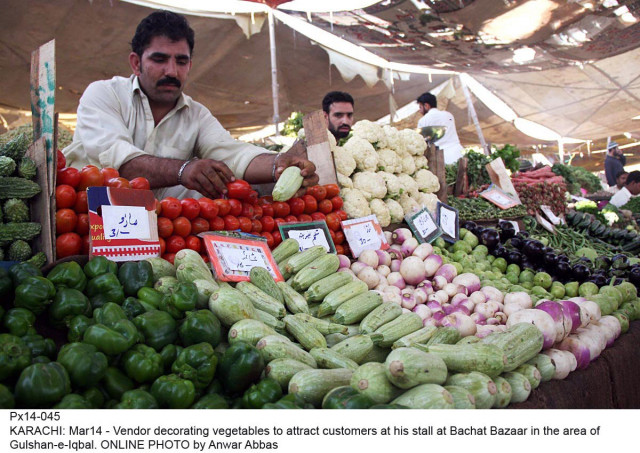Core inflation jumps to four-year high at 8%
Increase points to inflationary pressures impacting prices of almost every household item

Increase points to inflationary pressures impacting prices of almost every household item. PHOTO: ONLINE
Core inflation - which excludes volatile food and energy prices - went up from 7.7% in August to 8% in September, reported the Pakistan Bureau of Statistics (PBS) on Monday.
However, the headline inflation, measured by the Consumer Price Index (CPI), eased to 5.1% in September. The key reason behind the slowdown was a 12.4% reduction in prices of perishable food items, showed the PBS inflation data.
The 8% core inflation was the highest in the past four years. Last time, the core inflation stood above that level was in September 2014 when the reading was 8.1%.
"A surge in core inflation was expected that was why the central bank increased key interest rate to 8.5% in its latest monetary policy announcement," said Dr Ashfaque Hasan Khan, a member of the Economic Advisory Council.
The narrowing gap between the key interest rate and the core inflation may lead to another round of interest rate hikes in the current fiscal year, according to some independent economists.
Core inflation hits highest level in almost 4 years
The central bank also revised upwards its inflation projection from 6.5% to 7.5% due to a higher-than-anticipated rise in international crude oil prices, an upward revision in domestic gas prices, a further increase in regulatory duties on imports and the continuing second round impact of previous exchange rate depreciations.
The government has announced up to 143% increase in gas prices while a decision on increase in power tariffs is expected to be taken by the Economic Coordination Committee on Tuesday.
An internal plan of the central bank and the finance ministry showed that the government wanted to increase interest rate to 9.5% and let the currency weaken to Rs136 to a dollar. The rupee has once again come under pressure in the open market after Pakistan started staff-level engagement with the International Monetary Fund.
PBS data showed that on a year-on-year basis, the kerosene oil price was 37.53% higher and petrol price was 24.8% higher in September 2018 over the same month last year. For October, the government has kept petroleum product prices unchanged and has reduced general sales tax.
Inflation touches 45-month high at 5.8%
Owing to the higher prices of petrol and high-speed diesel, transport service charges also went up 15.4% in September.
The cost of educational services increased 15.1% and that of motor vehicles 11.4% due to depreciation of the rupee against the US dollar. Newspaper charges increased 10.4% and construction wages rose 9.2% compared with a year ago.
In the food group, meat prices rose over 10.5% and spices rates also surged over one-tenth. The cost of dry fruits, rice, tea and other food items jumped in the range of 6% to 10%.
The reduction in overall inflation rate to 5.1% was due to a dip in the cost of vegetables, mainly onion, pulses, potato, tomato and eggs.
Inflation is inching up, particularly from March 2018 onwards. So far, the average inflation in first quarter (Jul-Sept 2018) stood at 5.6% as compared to 3.4% in the corresponding period of previous fiscal year.
The impact of regulatory duties imposed on hundreds of goods through a mini-budget will be felt in coming weeks.


















COMMENTS
Comments are moderated and generally will be posted if they are on-topic and not abusive.
For more information, please see our Comments FAQ